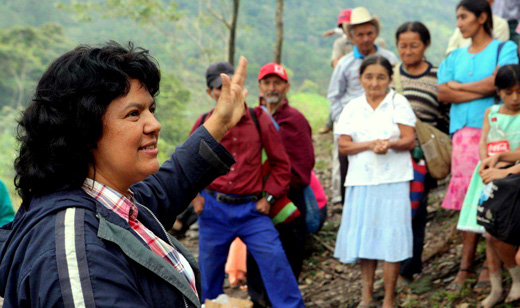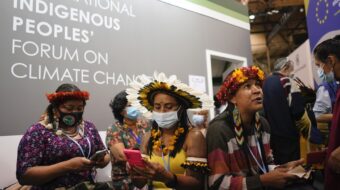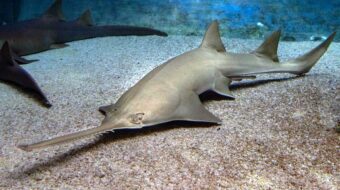
Early Thursday morning, March 3rd, at least two men in ski masks broke into the home in La Esperanza, in the Department of Intibucá in Western Honduras, where the internationally-known Indigenous and environmental rights leader Berta Cáceres was staying. They fractured her arm and leg, and then shot her at least eight times, killing her. She was 44 years of age. A Mexican environmentalist activist, Gustavo Castro Soto, who was staying at the house, was injured in the attack, but survived. Honduran authorities say they have arrested two people for the crime, for which a motive is not stated. Many Hondurans will greet these arrests with skepticism.
Berta Cáceres was a daughter of the indigenous Lenca people. Since the 1990s and until her death, she had struggled against abuses by a series of right-wing governments in her country and also against large-scale mining and dam-building projects carried out by Honduran and foreign companies. She and her neighbors denounced these projects as threatening both the physical environment and the livelihood of the Lenca and other poor rural people. To this end, she co-founded and led the Council of People’s and Indigenous Organizations of Honduras (Consejo Cívico de Organizaciones Populares e Indígenas de Honduras – COPINH) in 1993. At that time, she was 23 years old.
Crusader for environmental justice
Cáceres, COPINH, and the Lenca people kept up their struggle and seemed to be on the verge of some success when the government of President Manuel Zelaya, elected in 2005, began to enact policies of land and labor reform as well as other progressive measures. However, Zelaya was overthrown by a military coup on June 28, 2009. Under the interim president installed by the coup, Roberto Micheletti, protests demanding the restoration of Zelaya were repressed.
Repression continued under President Porfirio Lobo, elected in a dubious vote on November 29, 2009. Murders of government opponents and human rights activists continued at a high level, and corruption took off as Zelaya’s progressive measures were repealed. Lobo’s successor, Juan Orlando Hernández, has presided over continuing violence and repression, as an orgy of corruption so outrageous that it has brought Hondurans into the streets to protest in numbers not seen since the days of the 2009 coup. Hernández has also tried to pack the judiciary with his political supporters.
Under Lobo and Hernández, Honduras has been thrown wide open for the activities of rapacious foreign extractive corporations, irrespective of the interests of people affected by their operations and the damage done to the environment. Berta Cáceres and COPINH have played a leading role in opposing these abusive operations. In particular, they have been fighting, often with direct action, to stop the Agua Zarca dam on the Gualcarque River, at Río Blanco in the north of the province of Intibucá.
The dam, whose construction was authorized mere months after the 2009 coup, will destroy the livelihood of the agricultural Lenca people as well as sites sacred to their culture. Moreover, the authorization for the dam and the acquisition of land titles for its construction appear to have involved massive fraud, including the forging of the signatures of Lenca leaders. This means that the dam project violates Convention 169 of the United Nations International Labor Organization, which requires that Indigenous and tribal people must give informed consent before such projects can proceed.
Honduran Company DESA (Desarrollos Económicos S.A.) and a Chinese company, Sinohydro, (which now says it has withdrawn) have secured funding for the project from European sources, including banks in the Netherlands, Finland, and Germany, plus the U.S. Agency for International Development. COPINH has accused DESA of hiring goon squads, who often wear ski masks like those worn by the people who murdered Cáceres, to intimidate and attack opponents of Agua Zarca. Indeed, there have been at least two other murders related to the project, part of a national pattern of physical attacks against opponents of the regime and of foreign corporate projects. The Honduran army has been known to work closely with DESA security.
For her struggle, Berta Cáceres received worldwide recognition. Last year she was awarded the prestigious Goldman Environmental Prize, whose website specifically mentions Cáceres’ success in pressuring Sinohydro, the Chinese consortium partner of DESA, to abandon the Agua Zarca dam project.
On Saturday, March 5th, a huge throng of people attended her funeral in La Esperanza. A courageous presence was her daughter, Olivia Zúñiga Cáceres, who laid the blame for her mother’s death squarely at the doors of DESA, the European financial companies which are bankrolling it, and the government of President Juan Orlando Hernández. She called Hernández a “participant, accomplice and culprit in this political crime.” Furthermore, she said, “President Juan Orlando Hernández, let me tell you: They killed Berta Cáceres, but your government is dying.”
Ms. Zúñiga Cáceres demanded that the murder of her mother be investigated by a body that includes international observers and not just Honduran officials, who she feels would be subject to pressure and bribery. Berta Cáceres was supposedly under police protection at the time she was killed, and the Inter-American Commission on Human Rights had demanded that she be protected.
A strong message from the United States
A message was also sent by U.S. Senator Patrick Leahy (D-Vt.), who, besides angrily denouncing the murder and the treatment to which the Lenca and other defenders of the people’s rights in Honduras have been subjected, strongly supported the demand for an international investigation of the murder. Leahy’s message read in part:
“First, the investigation of this crime must be independent and comprehensive, including the participation of international experts. Those responsible for ordering and carrying it out must be brought to justice.
“Second, the Río Blanco and the territory that Berta devoted her life to defend, should be protected. The Agua Zarca dam project should be abandoned.
“And third, all Hondurans, and most importantly its leaders, should publicly dedicate themselves to defending the legitimate role of activists like Berta, of civil society organizations like COPINH, of independent journalists, and others who peacefully exercise their rights to expose the truth and to demand a more just society. It is the responsibility of the government to protect them, not to treat them as legitimate targets of intimidation and arrest.”
Senator Leahy stopped short of adding that the United States government bears a heavy responsibility for the death of Berta Cáceres and many other Honduran defenders of justice. Not only did the U.S. State Department, under Hillary Clinton, help to consolidate the coup of June 2009 (a fact long suspected by many in Latin America and since confirmed by some of Clinton’s e-mails), but the U.S. government has continued to channel funds to the Honduran security forces which are implicated in much of the violence.
Action urged to protect witness and stop interference
There are some immediate priority tasks for people in the U.S. who care about this situation. One is to make sure that the Mexican witness to the murder, Gustavo Castro Soto, is not also murdered. He attempted to return to Mexico on Sunday morning but was detained at the airport by Honduran authorities who are currently holding him.
Many progressive organizations and individuals in the U.S. have been denouncing the Honduras situation since the 2009 coup, including the AFL-CIO in a recent report dealing with the repressive, violent situation in the country. Environmental defense groups in the U.S. have also denounced the murder of Berta Cáceres and called for an accounting.
Persons of goodwill are being asked to demand that he be allowed to leave Honduras as soon as possible, as his life is in serious danger. There is an urgent need to contact the Embassy of Honduras in Washington, D.C., to demand from Ambassador Jorge Alberto Milla Reyes that Castro Soto be allowed to return to Mexico immediately and that the lives of Berta Cáceres’ family, friends, and colleagues, and of all human rights defenders and others active in the struggle for social justice in Honduras, be protected.
Copies of communications should be sent to the U.S. Ambassador in Tegucigalpa, the Honduran capital, James D. Nealon. In addition, messages should be sent to the U.S. State Department and the White House demanding an end to funding the repressive Honduran military and security services.
Finally, all of us should contact our representatives in the U.S. Senate and the House of Representatives to insist that they support Sen. Leahy’s demands, as well as a cutoff of U.S. funds for the Honduran military and security forces.
Photo: Honduran Indian leader and environmentalist Berta Caceres. | AP












Comments